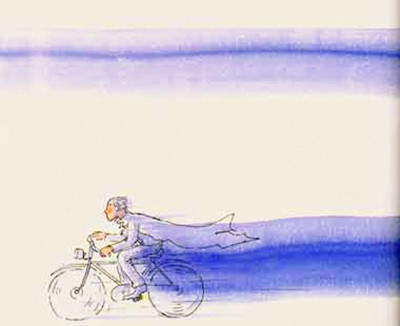
I step off the train a few days later to a Rome full of hot, sunny, eternal disorder, where—immediately upon walking out into the street—I can hear the soccer-stadium-like cheers of a nearby manifestazione, another labor demonstration. What they are striking about this time, my taxi driver cannot tell me, mainly because, it seems, he doesn't care. " 'Sti cazzi," he says about the strikers. (Literal translation: "These balls," or, as we might say: "I don't give a shit.") It's nice to be back. After the staid sobriety of Venice, it's nice to be back where I can see a man in a leopard-skin jacket walking past a pair of teenagers making out right in the middle of the street. The city is so awake and alive, so dolled-up and sexy in the sunshine.
I remember something that my friend Maria's husband, Giulio, said to me once. We were sitting in an outdoor café, having our conversation practice, and he asked me what I thought of Rome. I told him I really loved the place, of course, but somehow knew it was not my city, not where I'd end up living for the rest of my life. There was something about Rome that didn't belong to me, and I couldn't quite figure out what it was. Just as we were talking, a helpful visual aid walked by. It was the quintessential Roman woman—a fantastically maintained, jewelry-sodden forty-something dame wearing four-inch heels, a tight skirt with a slit as long as your arm, and those sunglasses that look like race cars (and probably cost as much). She was walking her little fancy dog on a gem-studded leash, and the fur collar on her tight jacket looked as if it had been made out of the pelt of her former little fancy dog. She was exuding an unbelievably glamorous air of: "You will look at me, but I will refuse to look at you." It was hard to imagine she had ever, even for ten minutes of her life, not worn mascara. This woman was in every way the opposite of me, who dresses in a style my sister refers to as "Stevie Nicks Goes to Yoga Class in Her Pajamas."
I pointed that woman out to Giulio, and I said, "See, Giulio—that is a Roman woman. Rome cannot be her city and my city, too. Only one of us really belongs here. And I think we both know which one."
Giulio said, "Maybe you and Rome just have different words."
"What do you mean?"
He said, "Don't you know that the secret to understanding a city and its people is to learn—what is the word of the street?"
Then he went on to explain, in a mixture of English, Italian and hand gestures, that every city has a single word that defines it, that identifies most people who live there. If you could read people's thoughts as they were passing you on the streets of any given place, you would discover that most of them are thinking the same thought. Whatever that majority thought might be—that is the word of the city. And if your personal word does not match the word of the city, then you don't really belong there.












